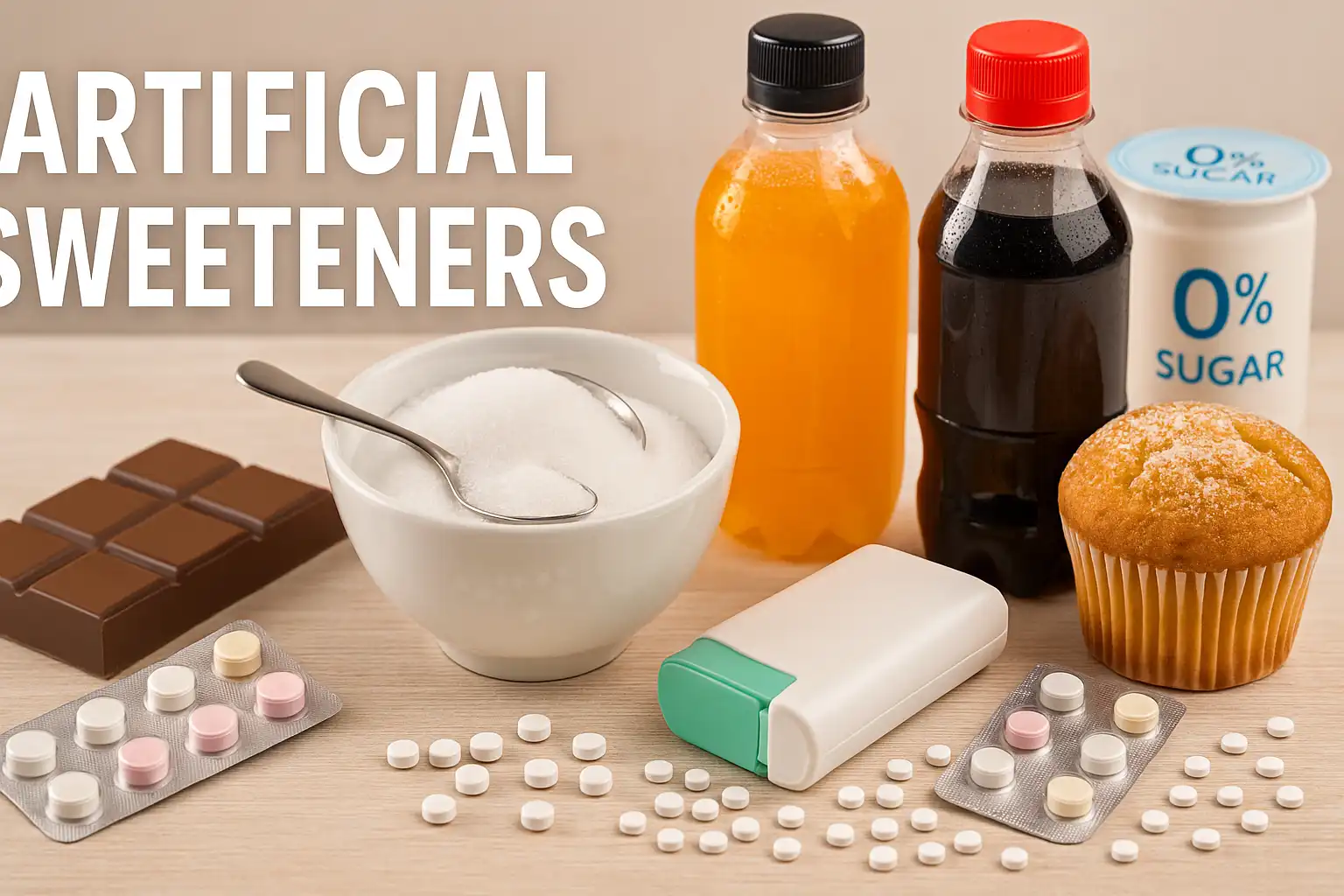1. The Sweet Dilemma
We’ve all been there: standing in the supermarket aisle, comparing sweeteners. Which one gives all the flavor without the calories? Artificial sweeteners—like aspartame, sucralose, or saccharin—often seem like the perfect sugar substitute.
But as research unfolds, the picture becomes more complex. Recent studies suggest excessive use of these sweeteners might accelerate cognitive decline, disrupt mood, and even alter brain chemistry.
This article takes you on a journey—navigating the latest evidence, explaining key concepts in everyday language, and giving you actionable insight to make informed choices.
2. Breaking Down the Key Study: Artificial Sweeteners & Cognitive Aging
The headline-grabbing study appeared in Neurology:
- Participants: 12,772 Brazilian adults
- Duration: 8 years
- Average age: 52
- Sweeteners tracked: Aspartame, saccharin, acesulfame-K, erythritol, sorbitol, xylitol, and for comparison—tagatose
Major Findings
- High intake (~191 mg/day) → 62% faster cognitive decline, equivalent to 1.6 extra years of brain aging
- Mid intake (~66 mg/day) → 35% faster decline, or 1.3 extra years
- Stronger effects seen in individuals under 60 and those with type 2 diabetes
- Tagatose stood out as the only sweetener not linked to accelerated decline
(Sources: [The Guardian], [SF Chronicle], [News-Medical], [Medical News Today])
Why It Matters
This was not a blink-or-miss-it result—it showed a dose-dependent effect. The more someone consumed, the steeper the decline. For context, moderate consumers (middle tier) were still aging cognitively at an accelerated rate.
3. What Is Cognitive Decline, and Why Should You Care?
- Cognitive decline refers to gradual losses in memory, attention, problem-solving, and verbal fluency.
- It’s a natural aspect of aging—around 0.5–1% per year in late adulthood. But an extra 1–2 years of “brain aging” in your 50s or 60s can make a meaningful difference in daily function and independence.
In effect, chronic intake of certain sweeteners might shift the baseline—making your brain “feel older” sooner.
4. Mechanisms: How Sweeteners Might Affect the Brain
A. Neuroinflammation
Lab studies suggest that some sweeteners promote inflammation in critical brain regions—like the hippocampus—which is essential for memory. Inflammation can stunt neurogenesis (new neuron formation) and impair synaptic function.
B. Disruption of the Gut–Brain Axis
We have trillions of bacteria in our gut that communicate with the brain via chemical messengers. Artificial sweeteners can alter this microbiome balance, potentially skewing brain signaling.
(Sources: [SF Chronicle], [Lonestar Neurology], [Wikipedia – Sucralose])
C. Thwarted Reward Signals
Studies (e.g. from USC) show that consumption of sucralose triggers hunger signaling pathways—the brain detects sweetness but receives no calories, so appetite grows. That mismatch may rewire hunger regulation.
D. Neurotransmitter Imbalance
Aspartame metabolizes into phenylalanine and aspartic acid, which may inhibit dopamine, serotonin, and norepinephrine—key to emotion, cognition, and focus.
(Sources: [PubMed])
E. Potential Heritable Effects
An animal study found aspartame-induced memory deficits passed on through the paternal line—hinting at epigenetic risks across generations.
(Sources: [Nature])
5. Cognitive Effects—Yes, But What About Mental Health?
Mood Alterations
Serotonin and dopamine disruptions can lead to mood swings, irritability, or depressive symptoms. While large-scale human trials are lacking, anecdotal reports and smaller studies raise enough concern to warrant caution.
Anxiety and Cravings
The unfulfilled reward—sweetness without calories—can create an unsatisfied brain that craves more. It’s a setup for emotional eating, stress-based snacking, and mood imbalance.
Energy and Focus
Misaligned appetite signals might lead to low energy or poor concentration—without realizing it’s tied to sweetener consumption.
6. Beyond Brains: Long-Term Effects on the Body
1. Cognitive Aging
As seen in the Brazilian cohort study—real effects on brain speed and memory.
2. Appetite Dysregulation & Weight
Artificial sweeteners disrupt hunger and satiety cues, potentially leading to overeating despite no-calorie intake.
3. Mood/Mental Health
Persistent brain chemical imbalance can manifest as anxiety, low mood, or emotional instability.
4. Multi-Generational Concerns
Preliminary animal evidence suggests possible inherited neurological effects.
5. Metabolism & Heart Health
Some research links sweetener intake to insulin resistance, metabolic syndrome, or cardiovascular risk—but data are mixed.
6. Sleep and Neurotransmitters
Anecdotes link sweetener intake (especially late in the day) to poor sleep—potentially tied to neurochemical shifts.
7. Do Sweeteners Mimic Sugar’s Dopamine Response?
Sugar triggers a cascade: sweet taste → gut nutrient sensing → energy reward → dopamine release.
Artificial sweeteners give the taste without the calories—creating a mismatch. At first, dopamine spikes. Over time, the brain learns: sweetness ≠ energy reward → dopamine response diminishes. The result? A duller reward system.
This could explain:
- Diminished pleasure from regular food
- Desire for more intense stimulation (to spike dopamine)
- Possible downregulation of baseline mood
8. Practical, Human Advice You Can Use
A. Keep It Modest
Avoid daily habit of consuming multiple servings of diet sodas or sweetener-laced products.
B. Choose Better Sweeteners
Tagatose, stevia, monk fruit, raw honey, or maple syrup can be better—and some (like tagatose) appear safer.
C. Shift to Whole Foods
Processed foods are the main vehicles. Cook more at home. Sweeten naturally. Let real food guide your palate.
D. Support Brain Health Strategically
- Move regularly
- Prioritize sleep
- Engage your brain (reading, puzzles, learning)
- Eat nutrient-rich foods (omega-3s, antioxidants)
E. Read Labels, Stay Curious
Artificial sweeteners are hidden in surprising places—watch for “diet,” “zero-calorie,” or “sugar-free” claims.
F. Keep Perspective
Moderation, not fear, should guide you. While risks exist, the evidence isn’t definitive—especially at low intake.
9. Real-Life Voices (and What Experts Say)
Dr. Smith, Neurologist: “We’re only beginning to understand how sweeteners interact with the brain. But these findings underscore the importance of caution—especially for younger adults.”
Emily, 45: “I drank diet soda daily. Switched to flavored water and noticed better focus and less afternoon slump.”
Limitation Note: Observational data suggest correlation—not causation. Randomized controlled trials are needed to confirm mechanisms.
10. Summary Table: Questions & Answers
| Question | Answer |
|---|---|
| Do artificial sweeteners affect brain function? | Possibly—studies show accelerated decline linked to high intake. |
| Can they affect mental health? | Potentially—due to mood systems and reward circuits disruption. |
| What are long-term effects? | Possible outcomes: faster brain aging, disrupted appetite, mood, metabolic risks. |
| Do they mimic sugar’s dopamine response? | Initially yes—sweet taste triggers dopamine; over time, the mismatch dulls reward responses. |
11. Final Thoughts—Sweetness with a Side of Awareness
Artificial sweeteners aren’t evil—but they’re not risk-free. Particularly when consumed daily or in high amounts, they may accelerate brain aging, dull reward systems, and disrupt your emotional equilibrium.
You don’t need to eliminate sweetness—just be thoughtful. Choose whole foods, common-sense sweeteners, and watch serving sizes. Your future self (and your brain) will thank you.






Be First to Comment